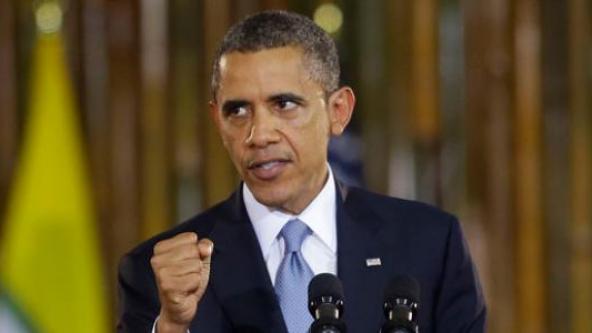
Today is Iowa caucus day, something we’ll be covering at DSW in between our regularly scheduled content both today and in future analysis as the primaries move forward. But before the caucuses wrap up I wanted to take a minute to say a personal word on the Democratic primary:
The first state hasn’t even voted yet, and I’m sick of this nonsensical power struggle already. It makes no sense, it’s dragging the party back into the ideologically split hell it needs to stay out of to remain viable, it’s trapped in the same crisis-minded thinking that the tea party has used as a thinly veiled justification to hold the country hostage for years, and much of it is built on a lie.
The lie is something that consistent conservatives and consistent liberals/progressives seem to agree on: America doesn’t simply have challenges it needs to face, it’s in decline. We are falling apart as a superpower, splitting open at the seams, etc. etc. Despite plenty of evidence to suggest otherwise, despite what has been called our greatest rival suffering through an economic slowdown, despite Russia, considered our main geopolitical rival, suffering a major economic crisis because of its incredibly stupid foreign policy decisions, despite double-digit unemployment still popular throughout Europe years after the Great Recession, despite a civil war in Syria producing refugees whose possessions are literally being stolen from them by countries like Denmark (which is often a country held up as a paradise the US should be aspiring to), despite all that, it’s us. America is a doomed, poisoned wasteland and we’re all going to die as slaves forced to work on oil rigs as the smog-choked air blots out the future sun.
This slightly pessimistic outlook has dominated the presidential primaries for both parties, primaries that started way too early. The campaign slogans say it all. Trump’s “Make America Great Again”. Sanders campaign rhetoric about restoring the American dream, a phrase that almost every single candidate has used at least once in recent years. Scapegoating of Muslims, millionaires, blacks, whites, and every other demographic group in the country during increasingly heated campaign speeches that are described by supporters of the candidates as “populist.” The groups being targeted might be different, the rhetoric might resonate with a different group of Americans, but the Democratic primary this cycle is threatening to turn into a mirror image of the bitter shit show going on in the other party.
And the reason is pretty Machiavellian, too. The amount of mud that’s been thrown by both front-runners at each other doesn’t normally happen unless there’s something deeper going on than the candidates. And there is: the introduction of raw and undirected populism into early 21st century American politics.

At least, it was raw and undirected for a little bit. But for most of the last few years, it’s been completely astroturfed. There’s actually a documentary called (Astro) Turf Wars that details how the Tea Party was started and then co-opted a few years ago by the fossil fuel industry and GOP mega-donors. Democrats seem to think they’re immune to that sort of thing; their form of populism is righteous and pure.
Not so fast, actually. There might be lest astroturfing (so far) in the left-leaning populism that threatens to split the Democratic party at a moment where it definitely cannot afford it, but there’s still plenty of fear and misinformation upon which certain presidential candidates are more than happy to capitalize. After all, an accurate reflection of both Secretary Clinton and Senator Sanders produce a huge amount of cognitive dissonance: how can two candidates who voted with each other in the Senate 93 percent of the time and whose views on issues only get more similar as the primary goes on be leading a campaign as filled with paranoia and background noise as it has been so far? Mistakes, real or misplaced accusations of sexism, endorsements showering down and even changing from people who would never normally endorse, hit pieces and nonexistent scandals, millions of people are caught up in the idea that this primary is very important and that the two frontrunners are radically different from one another.
But here’s the thing: that’s simply not true. The combination of a false perception of why Barack Obama won the nomination in 2008 with encyclopedias worth of populist propaganda and fearmongering has led millions of people to believe America is facing a massive crisis and on the verge of revolution when in reality only the Democatic party is facing massive crisis. The problem, of course, is if the Democrats don’t get their shit together this country actually will be plunged a few circles deeper into hell then Bush managed to get it just eight years ago when a Republican president and Republican Congress start rewriting the tax code, building a border wall, registering and tracking Muslims, opening temples to Reagan, and whatever else they have planned. In order to keep this from happening, on the eve of hearing results from the Iowa caucuses, we all have to calm down, take a deep breath, and critically examine both what’s happening and how to fix it.
The examination starts with OFA in 2008. Now known as Organizing for Action, OFA started as Obama for America, an arm of the 2008 campaign which did most of its field and political work somewhat independent of the DNC’s own work on the presidential campaign. This was an organization born from the mind of a community organizer turned presidential candidate and it’s not an understatement to say it completely revolutionized the way politics is done in this country. It brought community organizing into the mainstream and after the election thousands of organizations and campaigns took lessons from that success, many even hiring staffers trained in OFA techniques.

The thing is OFA was and is about a new (old if you know your history) way of organizing while Barack Obama’s historic presidency and indeed the man himself have been about a new way of thinking about politics. Despite the media and his supporters turning him into something of a celerity in 2008, Obama was different in that he sincerely didn’t want his time in office to be about him as a political personality. People adored the man, but he was prescient enough to understand that wasn’t always a good thing and had no problem telling the American people the truth, whether or not they actually wanted to hear the truth.
There is little evidence Clinton or Sanders on the Democratic side and Trump or Cruz or Rubio (just to name a few) on the Republican side have the interest or ability in doing the same. That’s why I cringe when I hear people on both sides describe this campaign as a movement, because the candidates in this campaign seem more interested in saying what people want to hear then what needs to be said. People who willingly subscribe themselves to part of a movement built around a single political identity (in other words a candidate), or at least the people who have done so this cycle, are all clearly influenced by the crash and burn worldview described above and are all more than ready to “take the country back”.
Here are a couple of great examples of just how people with this mentality think and how they’re engaging on the ground in Iowa as we speak. Their movement, because it is centered around the candidate, quickly becomes an all-or-nothing mentality about the candidate themselves and whether the public should nominate them. A pro-Trump blog tells supporters, “Let others know, especially the press, there’s only 1 CHOICE you’ll accept.” (For the record I’m completely mystified as to why choice is capitalized). A similar guide on Reddit was set up for Bernie Sanders with even more revealing advice like “KNOW at least some of BERNIE’S positions!” (again with the random caps).
In other words, the “movement” is about the candidate, not actually the issues. The candidate sells the crisis, points out a few important facts almost as a way to deflect from the fact that those are only facts being mentioned in their stump speech, and gets mad. 21st century movement politics suffers from an overload of emotion and a severe shortage of actual policy.
And that’s not an accidental occurrence, which brings me to what I consider to be the greatest and most sinister lie of the political age, a lie which is currently dominating the Democratic primary and the election in general. I mentioned astro-turfing in this article because the phenomenon happening now is very similar. Particular in the Democratic primary, candidate centered movements are being sold as something that happens organically. Hordes of people are just mad as hell and aren’t going to take it anymore.
Except that they’re already being co-opted (on the Democratic side at least and I’m sure on the other side as well) to fight a battle that is anything but revolutionary: the tired and age-old fight between the center-left and the far left. Same old battle, just being played out with new boots on the ground. The talking points barely even change. And what’s amazing about ideological fights when they happen are the results they can produce. Think about this for a second: we are going into Iowa with two large movements, one in each political party, for revolutionary change. And if those movements are successful we will walk into the general election immediately following the administration of the first African-American president with two old white guys from the northeast still fighting the election of 1968 as our candidates.
More on this after the results.

















